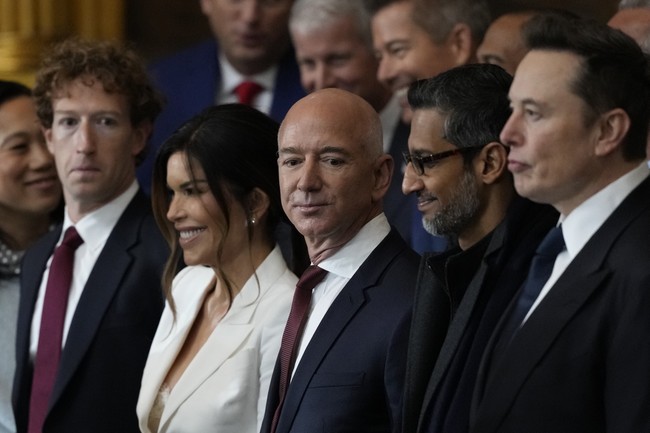
How do you buy off a multi-billionaire? Answer: you don’t, a lesson that one of the richest men in the world just learned — the hard way.
So says the Wall Street Journal, anyway. In an exclusive report on Mark Zuckerberg’s alleged strategy to avoid an antitrust trial for Meta, a story unfolds about straight-out influence peddling that flopped miserably. Rather than take an offer from the Federal Trade Commission to pay $30 billion in damages and accept a consent decree to unwind key acquisitions, Zuckerberg gave $1 million to Donald Trump’s inaugural fund and countered with $450 million to the FTC.
And he thought that would work:
Mark Zuckerberg called the head of the Federal Trade Commission in late March with an offer: Meta would pay $450 million to settle a long-running antitrust case that was about to go to trial.
The offer was far from the $30 billion that the FTC had demanded. It was also a fraction of the value of Instagram and WhatsApp, the two apps Meta had bought and were at the heart of the government’s case.
On the call, Zuckerberg sounded confident that President Trump would back him up with the FTC, said people familiar with the matter. The billionaire Facebook co-founder had been developing closer ties to Trump—his company donated $1 million to Trump’s inauguration and settled a $25 million lawsuit—and had been pressing the president in recent weeks to intervene in the monopoly lawsuit.
After Joe Biden’s disastrous debate performance and the assassination attempt on Trump in Butler County, PA, Zuckerberg began pursuing Trump with newfound expressions of ardor. He publicly called Trump “badass,” settled Trump’s lawsuit against Meta (over his banishment) for $25 million, and contributed the million-dollar donation to the inauguration fund. According to the WSJ and other media outlets, Zuckerberg then began frantically lobbying Trump to order the FTC to settle the case on more favorable terms or withdraw it altogether.
How well did that work out? The WSJ notes wrily:
For Zuckerberg, who has spent tens of millions in recent years aiming to rebuild his relationship with Trump, the failure to reach a deal pretrial suggests he isn’t getting much return on his investment.
Trump has long demanded significant changes in Big Tech. He’s still convinced that Zuckerberg and others in that industry conspired to defeat him in 2020, and his base intensely disliked the quasi-monopolistic power in companies like Meta and Google. Zuckerberg may have been a little too obvious in his obsequiousness with Trump too; his self-interest could be seen a mile away, even if Zuckerberg had tried more to hide it.
In the end, it didn’t work, and now Zuckerberg just spent the last two days on the witness stand in the trial. How’s it going for Meta? It’s difficult to say, but one can understand why Zuckerberg tried everything except paying up to avoid it:
In one email, Mr. Zuckerberg told Sheryl Sandberg, Meta’s chief operating officer at the time, that he could teach her to play Settlers of Catan, a popular board game. He went on to criticize some lieutenants, saying their lagging performance was one reason they needed to buy Instagram for $1 billion.
“A billion dollars is very expensive,” Mr. Zuckerberg said on the stand.
In another email, from 2013, Mr. Zuckerberg told executives to block foreign competitors, including popular Asian messaging apps like Kakao and WeChat, from advertising on Facebook.
“Those companies are trying to build social networks and replace us,” he wrote. “The revenue is immaterial to us compared to any risk.”
Reuters points to “a key confession” that may have Zuckerberg wishing he took the FTC’s final offer:
Meta CEO Mark Zuckerberg made a key confession at a U.S. antitrust trial on Tuesday, saying he bought Instagram because it had a “better” camera than the one his company was trying to build for flagship app Facebook at the time.
The acknowledgement appeared to bolster allegations by U.S. antitrust enforcers that Meta had used a “buy or bury” strategy to snap up potential rivals, keep smaller competitors at bay and maintain an illegal monopoly. …
Asked by an attorney for the FTC whether he thought fast-growing Instagram could be destructive to Meta, then known as Facebook, Zuckerberg said he believed Instagram had a better camera product than Facebook was building.
“We were doing a build vs. buy analysis” while in the process of building a camera app, Zuckerberg said. “I thought that Instagram was better at that, so I thought it was better to buy them.”
This could be damaging, or it might be irrelevant. Meta isn’t hiding its acquisition strategy; instead, it will argue that the FTC’s antitrust enforcement doesn’t apply because Meta has a number of competitors, especially in the Instagram area. Both Twitter and TikTok are major competitors, but so are Snapchat, TruthSocial, YouTube and Rumble to an extent, and other lesser-known social-media platforms.
Will that win? Meta sounds confident, but if the WSJ’s report is accurate, Zuckerberg sounds anything but. Stay tuned.

















